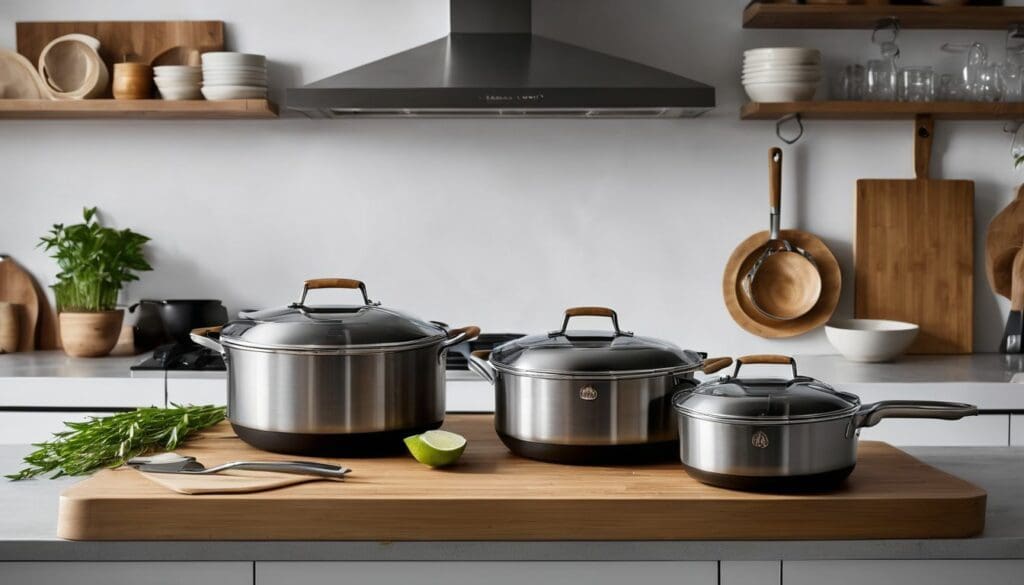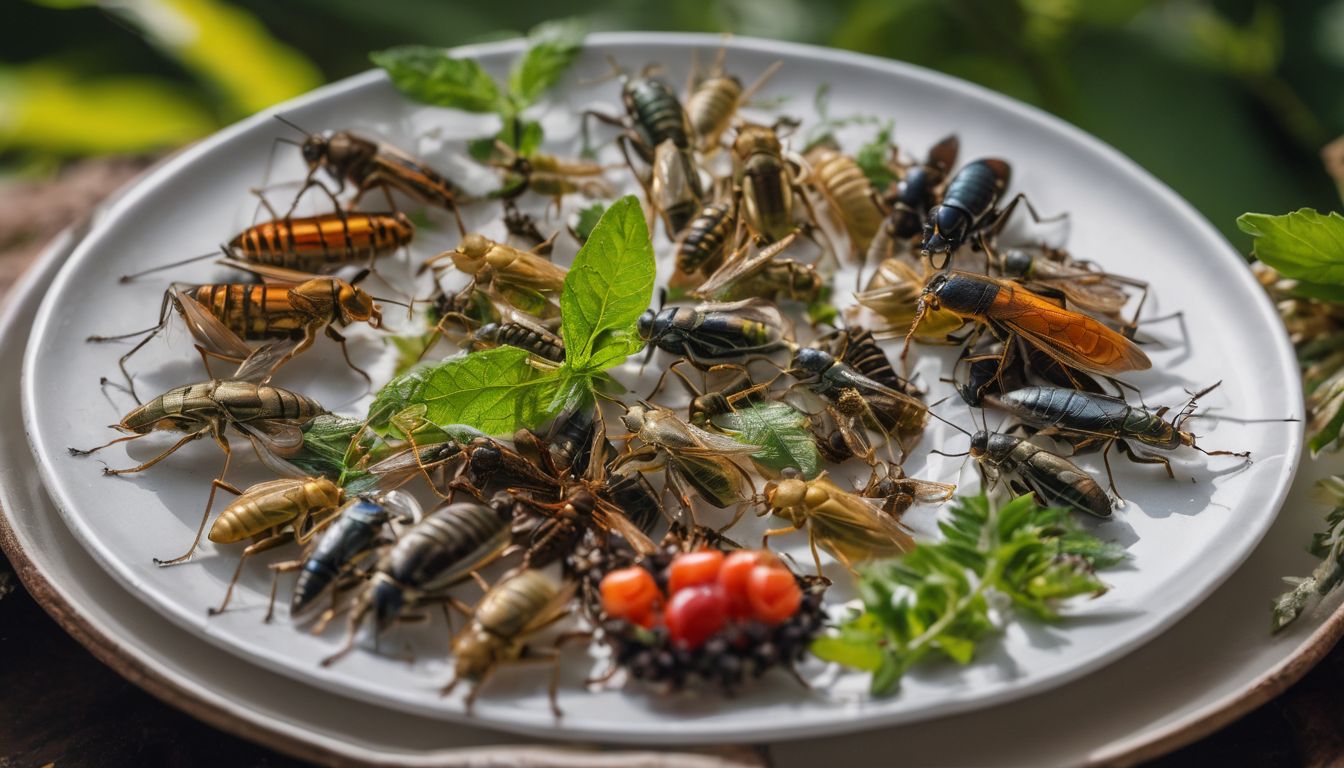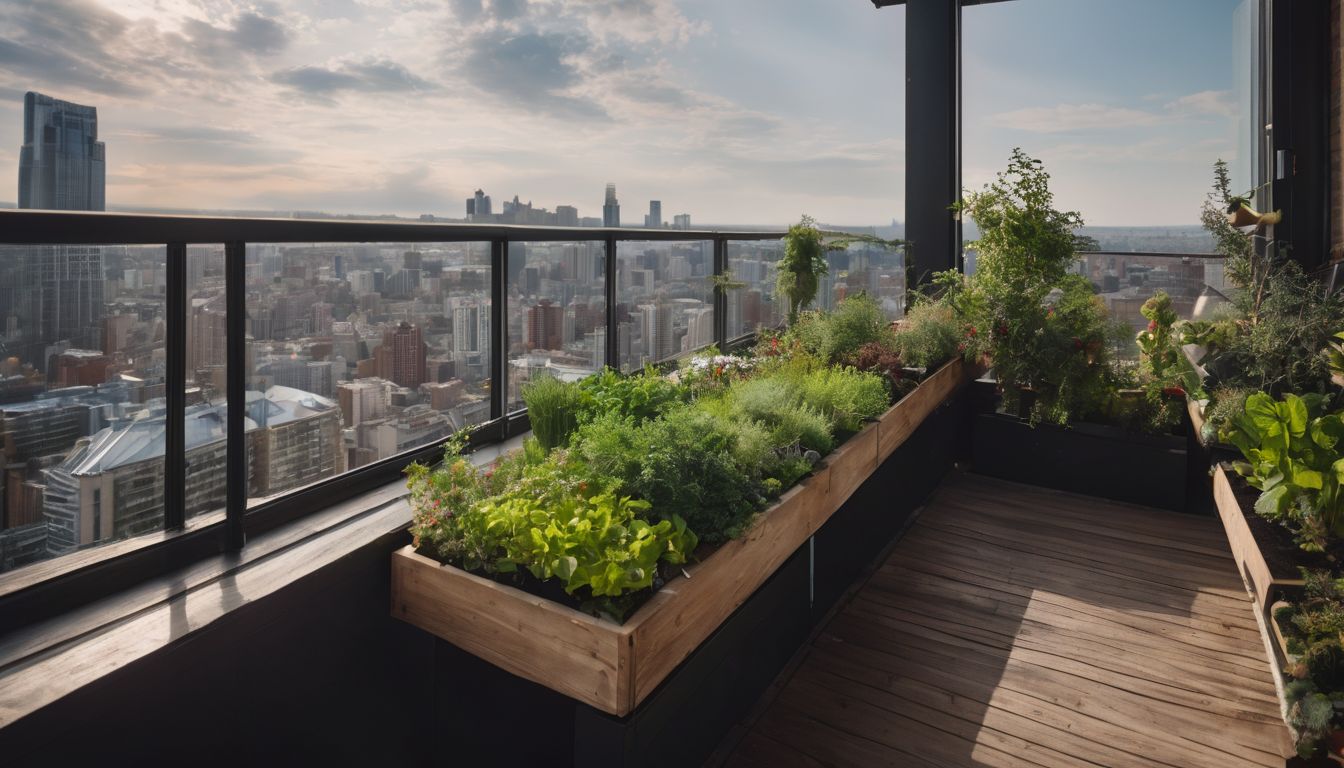Concerned about the planet, many of us wonder how our cooking habits affect the environment. Every year, tonnes of kitchen waste contribute to global pollution. This article promises a guide to swapping out your cookware and utensils for sustainable options that Earth will thank you for.
Let’s cook up a change!
Key Takeaways
- Selecting non – toxic cookware like ceramic, cast iron, or stainless steel reduces exposure to harmful chemicals and lessens environmental damage.
- Utilising eco – friendly utensils made from materials such as bamboo or recycled plastic helps decrease plastic waste and conserves natural resources.
- Composting kitchen scraps turns organic waste into nutrient – rich soil instead of contributing to landfill mass, therefore cutting down greenhouse gas emissions.
- Investing in energy – efficient appliances and using sustainable food storage solutions such as glass containers or beeswax wraps can significantly lessen your carbon footprint.
- Supporting eco – conscious brands that prioritise ethical manufacturing processes encourages wider availability of sustainable kitchen products.
Understanding the Impact of Unsustainable Kitchenware
Unsustainable kitchenware, such as plastic utensils and non-stick cookware, contributes to plastic pollution and chemical exposure. Additionally, the production of these items depletes valuable resources.
Making the switch to sustainable alternatives can help reduce these environmental impacts.
Plastic pollution
Plastic pollution strikes a significant blow to our environment, especially in the kitchen where disposable utensils and containers are commonplace. Plastic items take centuries to decompose, littering landfills and oceans alike.
These pollutants not only mar natural beauty but also pose threats to wildlife who ingest or become entangled in them. Every piece of sustainable cookware or eco-friendly utensil you choose helps cut down this relentless tide of waste.
Switching from plastic can vastly reduce your environmental footprint while safeguarding your health from chemical exposure often associated with plastic products. Your conscious choices influence resource conservation, propelling the move towards greener living spaces and a healthier planet.
Embracing alternatives like stainless steel cookware sets or ceramic pots champions sustainability and ushers you into the realm of chemical-free cooking environments.
Chemical exposure
Choose non-toxic cookware to minimise exposure to harmful chemicals like PFOA and PFAS, commonly found in traditional non-stick pans. Opt for ceramic or stainless steel cookware for a safer cooking experience.
Look for labels indicating the absence of lead, cadmium, or other heavy metals in your pots and pans.
Prioritise sustainable kitchen items that are free from hazardous chemical coatings and ensure you select eco-friendly utensils made from safe materials such as bamboo or recycled plastic.
Resource depletion
To create a sustainable kitchen, it’s crucial to consider the impact of resource depletion. By choosing eco-friendly cookware and utensils made from renewable or recycled materials, individuals can help reduce the demand for new resources.
Opting for non-toxic cookware and utensils also supports this effort, as it encourages the use of safer production methods that are less harmful to the environment. Making conscious choices about kitchen tools not only benefits personal health but also contributes to preserving natural resources for future generations.
When selecting eco-friendly kitchenware options, consider their potential to minimise resource depletion and support a more sustainable lifestyle. By prioritising products made from recycled materials or renewable resources, environmentally conscious individuals can actively participate in reducing the strain on our planet’s finite resources.
Essential Sustainable Kitchenware Products
Switching to sustainable kitchenware products, such as reusable food storage containers, eco-friendly utensils, non-toxic cookware, natural cooking/baking utensils, organic cotton hand towels and composting food scraps can greatly reduce your environmental impact.
These small changes in your kitchen can make a big difference in the long run.
Reusable food storage
Switching to reusable food storage containers is an easy way to reduce single-use plastic waste in the kitchen. These eco-friendly alternatives, made from materials like glass, stainless steel, or silicone, are durable and help keep food fresh without leaching harmful chemicals into your meals.
By choosing sustainable options for food storage, you can make a positive impact on the environment while keeping your kitchen organised and efficient.
Next up, let’s explore the benefits of using eco-friendly utensils in your kitchen.
Eco-friendly utensils
When it comes to sustainable kitchenware, eco-friendly utensils are an essential part of an environmentally conscious kitchen. Choosing utensils made from renewable resources such as bamboo or stainless steel can significantly reduce the environmental impact of your cooking and dining experiences.
These utensils are durable and long-lasting, making them a practical and eco-friendly choice for any home.
Opting for eco-friendly utensils also reduces the reliance on single-use plastic cutlery and disposable tableware, helping to minimise plastic pollution in landfills and oceans. Additionally, choosing natural materials for your utensils means avoiding potential exposure to harmful chemicals often found in conventional plastic or non-stick cookware.
Non-toxic cookware
Non-toxic cookware is a key component of an environmentally conscious kitchen. Opt for ceramic, stainless steel, or cast iron pots and pans to avoid harmful chemical exposure. These options are durable, sustainable, and do not release toxic fumes when heated.
When selecting cookware, look for brands that offer non-toxic alternatives without compromising on performance. By choosing non-toxic cookware, you can create a safer cooking environment while reducing your environmental impact.
Natural cooking/baking utensils
Choose natural cooking and baking utensils made from sustainable materials such as bamboo, wood, or stainless steel to reduce environmental impact. Bamboo and wood are renewable resources and biodegradable, making them eco-friendly choices.
Stainless steel utensils are durable, long-lasting, and can be recycled at the end of their life cycle. These natural options not only minimise plastic waste but also provide safer alternatives to synthetic cooking tools.
Opt for silicone baking mats instead of disposable parchment paper for a more sustainable choice that reduces single-use waste. Silicone mats are reusable, non-toxic, easy to clean, and withstand high temperatures without emitting harmful chemicals.
Organic cotton hand towels
Organic cotton hand towels are a sustainable alternative to regular hand towels, as they are made from natural materials and do not contain synthetic chemicals. These hand towels are gentle on the skin and environmentally friendly, making them an ideal choice for eco-conscious individuals.
By using organic cotton hand towels, you can reduce your environmental impact and support ethical and sustainable practices in the production of everyday household items.
When selecting organic cotton hand towels for your kitchen, look for brands that prioritise fair trade practices and use certified organic cotton. Additionally, ensure that the dyes used in the manufacturing process are eco-friendly to minimise harm to the environment.
Composting food scraps
Composting food scraps is a simple and effective way to reduce kitchen waste. By collecting fruit and vegetable peels, coffee grounds, and eggshells in a compost bin, you can create nutrient-rich soil for your garden.
This eco-friendly practice reduces the amount of organic waste sent to landfills while also minimising greenhouse gas emissions. Composting also helps enrich the soil, promoting healthier plant growth and reducing the need for chemical fertilisers.
This sustainable approach aligns with environmentally conscious living by supporting conservation efforts.
To start composting food scraps, designate a container in your kitchen for collecting organic waste. Add dry materials like leaves or shredded newspaper to create an optimal carbon-to-nitrogen balance within the compost pile.
Eco-Friendly Cookware Brands
Discover eco-friendly cookware brands such as Caraway, Great Jones, Our Place, Kana, Xtrema, and Material – all committed to sustainable kitchenware. Read on to find the best options for your environmentally conscious kitchen!
Caraway
Caraway offers a range of non-toxic, eco-friendly cookware that is both stylish and sustainable. Their ceramic-coated pots and pans are free from harmful chemicals like PFOAs, lead, and cadmium, making them a safe choice for environmentally conscious cooks.
Caraway’s thoughtful design also includes ergonomic handles made from recycled materials and lids with built-in strainers to minimise water usage during cooking.
For those seeking sustainable kitchen solutions without compromising on style or function, Caraway provides an excellent option for ethical cooking equipment. Their commitment to using renewable materials and reducing environmental impact make them a standout choice for anyone looking to create an earth-friendly kitchen.
Great Jones
Transitioning from eco-friendly cookware brands to another standout option, Great Jones offers a range of high-quality and environmentally conscious kitchen tools. With a commitment to sustainability, their cookware line is crafted with non-toxic materials and innovative designs that promote eco-friendly cooking practices.
Great Jones presents a responsible choice for individuals looking to invest in durable and safe kitchen essentials while reducing their environmental footprint.
Our Place
Transitioning from eco-friendly cookware brands like Great Jones, Our Place offers a range of thoughtfully designed kitchen essentials. Their focus on sustainability and versatility is evident in their multifunctional Always Pan, which replaces multiple pieces of traditional cookware.
The pan’s non-toxic ceramic coating ensures safe cooking, while its modular design reduces the need for excess utensils and spaces in your kitchen. Our Place also prioritises ethical manufacturing and environmentally friendly packaging, making it an ideal choice for those seeking stylish, practical, and sustainable kitchen solutions.
Kana
Kana offers a range of eco-friendly cookware that is both stylish and sustainable. Their products are made from high-quality materials, including ceramic and non-toxic coatings, ensuring that your cooking experience is safe for you and the environment.
Kana’s commitment to sustainability extends beyond their product design – they also prioritise ethical manufacturing processes, reducing waste, and using recyclable packaging. With Kana cookware, you can enjoy a guilt-free culinary experience while contributing to a greener planet.
If you’re looking for environmentally friendly kitchen tools that are both functional and sustainable, Kana’s range of cookware is an ideal choice. From their non-toxic coatings to their emphasis on ethical manufacturing practices and recyclable packaging, Kana prioritises sustainability without compromising on style or performance.
Xtrema
Xtrema offers a line of cookware made from pure ceramic, free of lead, cadmium, and heavy metals. This durable cookware is versatile for use on the stovetop, in the oven, or even on the grill.
Xtrema’s products are scratch-resistant and easy to clean without the need for chemical-laden non-stick coatings. With its sleek design and commitment to sustainability, Xtrema provides environmentally conscious individuals with a safe and eco-friendly option for their kitchen needs.
The cookware by Xtrema boasts excellent heat retention properties and can be used at high temperatures without releasing harmful fumes or toxins into your food or environment. Additionally, this brand’s dedication to sustainable practices makes it an ideal choice for those seeking renewable and non-toxic cooking solutions that align with their conservation efforts.
Material
Material choice is crucial when it comes to sustainable cookware and utensils. Opt for non-toxic options like ceramic, stainless steel, or cast iron as they are durable and environmentally friendly.
These materials also eliminate the need for harmful chemicals often found in traditional non-stick coatings, making them a safe choice for your health and the environment. Look for products made from recycled materials or those that can be easily recycled at the end of their life cycle to minimise waste.
Considering material sustainability in kitchen tools extends beyond cookware – natural wood, bamboo, and silicone are great choices for eco-friendly utensils. These alternatives are biodegradable and renewable, reducing your ecological footprint while still delivering functionality in the kitchen.
Making conscious choices about the materials you bring into your home sets a positive example and contributes to a healthier planet.”.
How to Choose Eco-Friendly Kitchen Tools
When choosing eco-friendly kitchen tools, it’s important to avoid toxic non-stick cookware and explore alternatives to Teflon. You can also make pans non-stick without chemicals and learn how to clean and care for cast iron cookware.
Avoiding toxic non-stick cookware
When choosing cookware, opt for non-toxic options such as stainless steel, cast iron, or ceramic. These alternatives eliminate the need for toxic non-stick coatings like Teflon that can release harmful chemicals when heated.
Look for eco-friendly cookware brands that use safe and sustainable materials in their products to ensure a healthier cooking experience.
Explore natural non-stick solutions such as seasoning and maintaining cast iron pans instead of relying on chemical coatings. By prioritising non-toxic cookware, you can support environmentally friendly practices and reduce your exposure to harmful substances while preparing meals.
Exploring alternatives to Teflon
When looking for sustainable cookware alternatives, consider ceramic and porcelain-coated options. These provide a non-toxic, non-stick cooking surface without the use of harmful chemicals such as PFOA and PFAS.
Additionally, cast iron skillets are durable, versatile, and naturally non-stick when properly seasoned. Stainless steel pans also offer a safe and eco-friendly alternative to Teflon coatings.
Furthermore, exploring alternatives to Teflon empowers environmentally conscious individuals to make informed decisions about their kitchenware. By opting for sustainable cookware like ceramic or stainless steel options, you can contribute to conservation efforts while creating healthy meals for your family.
Making pans non-stick without chemicals
Moving on from exploring alternatives to Teflon, making pans non-stick without chemicals provides a safe and sustainable option for environmentally conscious individuals. One way to achieve this is by seasoning cast iron cookware with oil and heating it in the oven.
This process creates a natural non-stick coating, perfect for eco-friendly cooking.
Another method involves using ceramic or enamel-coated cookware, which naturally prevents food from sticking without the need for harmful chemicals. By opting for these non-toxic options, you can enjoy the convenience of non-stick pans while reducing your environmental impact.
Cleaning and caring for cast iron cookware
To ensure your cast iron cookware stays in optimal condition, it’s important to clean and care for it properly. Begin by rinsing the pan with hot water and gently scrubbing it with a stiff brush or sponge to remove any food residue.
Avoid using soap as it can strip away the seasoning that gives the pan its natural non-stick properties. Once cleaned, dry the cookware thoroughly to prevent rusting. To maintain its seasoning, apply a light layer of oil after each use and store it in a dry place.
Regularly seasoning your cast iron cookware will help keep it non-stick and prevent rusting over time. It’s also essential to avoid exposing the cookware to harsh chemicals or abrasive cleaning agents, which could damage its surface or compromise its natural properties.
Other Eco-Friendly Kitchen Tools
Explore natural dish and hand soap, eco-friendly food storage options, safer appliances, zero waste coffee and tea solutions, and water filters to complete your sustainable kitchen.
Discover more ways to make your kitchen eco-friendly by reading the full blog.
Natural dish and hand soap
Choose natural dish and hand soaps made from plant-based ingredients, such as coconut or olive oil. Look for biodegradable formulas that are free from synthetic fragrances, dyes, and harsh chemicals.
By opting for eco-friendly options, you can reduce harmful chemical runoff while still effectively cleaning your kitchenware and hands.
Some sustainable brands offer refillable containers to minimise plastic waste. Consider choosing products with minimal packaging or those packaged in recyclable materials for an even greener option.
Kitchen cleaning supplies
When transitioning from natural dish and hand soap to kitchen cleaning supplies, it’s essential to consider eco-friendly options that align with sustainable practices. Opt for natural cleaners made from plant-based ingredients or biodegradable materials.
Look for products that are free from harsh chemicals, toxins, and artificial fragrances to keep your kitchen clean without harming the environment.
Choose reusable and washable cleaning tools such as microfiber cloths, sponges made from natural fibers like cellulose, or brushes with bamboo handles. Additionally, you can make your own cleaning solutions using simple ingredients like vinegar, baking soda, and lemon juice.
Eco-friendly food storage
Opt for eco-friendly food storage options such as glass containers, silicone bags, and stainless steel lunchboxes. These alternatives are reusable, durable, and free from harmful chemicals found in plastic containers.
By choosing these sustainable food storage solutions, you can reduce single-use plastics and contribute to a healthier environment.
Consider beeswax wraps as an alternative to cling film for keeping your food fresh. Beeswax wraps are made from biodegradable materials and can be washed and reused multiple times.
Safer appliances
When selecting kitchen appliances, opt for energy-efficient models to reduce your carbon footprint and save on utility bills. Look for eco-friendly certifications such as Energy Star to ensure you’re choosing sustainable options that have been independently verified.
Additionally, consider the lifespan of the appliances and choose durable, long-lasting products that will minimise waste in the long run. By investing in safer appliances with lower environmental impact, you can contribute to a more sustainable kitchen and reduce your overall ecological footprint.
Moving forward into “Zero-waste coffee and tea,” let’s explore how simple changes in our daily habits can lead to greater sustainability in our homes.
Zero waste coffee and tea
To achieve zero waste coffee and tea, consider using reusable coffee filters or pods, which reduce the need for single-use items. Opt for loose-leaf tea instead of tea bags as they often contain plastic.
Use a stainless steel or glass cafetiere instead of disposable paper filters. When brewing your beverages, choose organic and fair trade options to support sustainable farming practices that benefit both people and the environment.
When making your morning brew, opt for a manual coffee grinder to avoid using electricity while also creating less waste than pre-ground coffee. Utilise a reusable insulated travel mug or thermos flask when on the go, reducing the need for disposable cups.
Water filters
When selecting water filters for your kitchen, seek out eco-friendly options that reduce the need for single-use plastic bottles. Look for brands offering sustainable filter cartridges made from recyclable materials to minimise environmental impact and foster a greener kitchen.
Opting for water filters with long-lasting durability can help in reducing waste, supporting conservation efforts by promoting reusable alternatives over disposable ones.
Considering the importance of clean drinking water, investing in an eco-friendly water filter not only benefits your household but also contributes to a healthier planet. Make informed choices when selecting sustainable kitchen tools, starting with environmentally friendly water filters that align with your commitment to conservation and sustainability.
Conclusion
In conclusion, making the switch to sustainable kitchenware is a simple but impactful way to reduce your environmental footprint. Choosing eco-friendly utensils and cookware brands can help minimise plastic pollution and chemical exposure while promoting resource conservation.
By opting for renewable, non-toxic, and recycled options in your kitchen, you are contributing to a healthier planet for future generations. Making conscious choices about your kitchen tools empowers you to create a more environmentally friendly home.
FAQs
1. What makes cookware and utensils eco-friendly?
Eco-friendly cookware and utensils are made using sustainable or recycled materials that have low environmental impact, like biodegradable or organic substances.
2. Can nontoxic pots and pans still be high quality?
Yes, nontoxic pots and pans can be of excellent quality, with some ecofriendly brands offering safe cookware alternatives without compromising on performance.
3. Are there any green cooking tools that are also renewable?
Certainly! There are renewable cookware options available made from materials such as bamboo, which is a fast-growing resource used in creating earthfriendly kitchen accessories.
4. How do I find environmentally friendly utensils for my kitchen?
Look out for green kitchen guides or search for ecofriendly utensil brands that prioritise the use of recycled or naturally sourced materials in their products.
5. Is it possible to get completely biodegradable kitchen tools?
Yes, you can find fully biodegradable kitchen tools on the market; these items decompose naturally over time without harming the environment.





